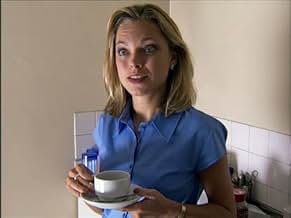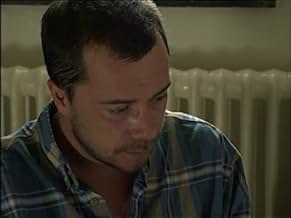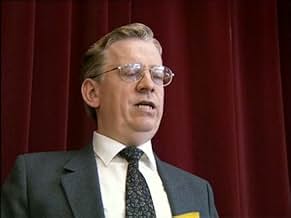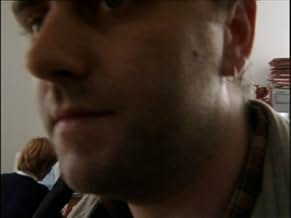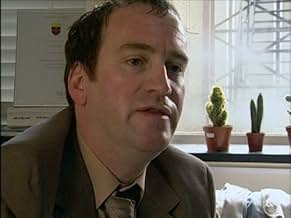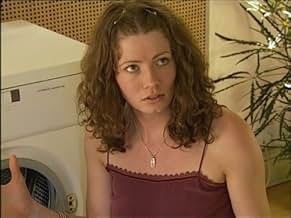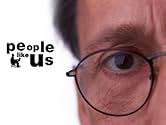Ordinary people's lives are documented in comic style by an off-screen narrator.Ordinary people's lives are documented in comic style by an off-screen narrator.Ordinary people's lives are documented in comic style by an off-screen narrator.
- Nominated for 1 BAFTA Award
- 2 wins & 2 nominations total
Browse episodes
Mark Hadfield
• 1999–2001
Mike Haley
• 1999–2001
Ewan Bailey
• 1999–2001
Iain Rogerson
• 1999–2001
Jilly Bond
• 1999
Beth Chalmers
• 2001
Colin Murphy
• 2001
David Roper
• 2001
8.3667
1
2
3
4
5
6
7
8
9
10
Featured reviews
9jefu
funny and painful at once
When I first saw this it took me a few minutes to catch on to the fact that it was not a real documentary - it looks and sounds like a real documentary if you don't pay attention, but when you do pay attention, the humour is pervasive and brilliant.
Humor is often associated with a darker side - cruelty, pain, sadness. Some of the funniest movies, books and tv shows are those that intermix these well. American TV doesn't seem to explore this side very much, but British TV comedy does and some of the best of british sitcoms are those that do this deeply - Basil Fawlty wouldn't be anywhere near as funny if he were just Bill Cosby. "The League of Gentlemen" goes quite a ways in this direction - far enough to squick some watchers. "People Like Us" is nothing like that extreme, but much of the humour is based on situations that (if they were happening to us) would probably not be considered "good days".
"People Like Us" takes the form of a documentary TV show (named "people like us") with "Roy Mallard" following "people like us" around in their jobs and interviewing them. We never really see Roy, but we hear his questions and comments. So far, it looks like many documentaries. And if you only watch
casually, it continues to look that way. But if you look and listen more closely, it becomes far more interesting. And very funny.
Part of the humour comes from Roy's commentary, which is wonderfully deadpan, but which often includes odd mistakes and misstatements. If you don't listen, you'll miss them - as often the various portions of the sentence make complete sense ("Although since the beginning of the twentieth century the number of people attending church regularly has fallen by twice that amount over the same period of time...") Part of the humour comes from the people he's interviewing. In some cases these people are hurting - they're on the verge of failure, or even beyond. In other cases things just go wrong. A bank manager forgets the password for his safe, a real estate agent gets lost. Roy walks off with a childs toy. Minor events and given minor consideration with no fanfare - but often very, very funny. (In American sitcoms, there'd be a laugh track, and sometimes this kind of incident would be the basis for a full episode.)
Interestingly, after a couple of episodes, it begins to seem that the title "People Like Us" is really true for Roy. The people featured are the ones that seem most like him in some ways. We never see Roy and don't hear much about him, but we do discover he is married and that this show for him is perhaps a step down from the farm report. And in some ways this show is a serious dissection of Roy, seen only in how other people are interacting with him.
Its hard to describe this program and how funny it can really be. Best thing to do is watch it and see for yourself.
Humor is often associated with a darker side - cruelty, pain, sadness. Some of the funniest movies, books and tv shows are those that intermix these well. American TV doesn't seem to explore this side very much, but British TV comedy does and some of the best of british sitcoms are those that do this deeply - Basil Fawlty wouldn't be anywhere near as funny if he were just Bill Cosby. "The League of Gentlemen" goes quite a ways in this direction - far enough to squick some watchers. "People Like Us" is nothing like that extreme, but much of the humour is based on situations that (if they were happening to us) would probably not be considered "good days".
"People Like Us" takes the form of a documentary TV show (named "people like us") with "Roy Mallard" following "people like us" around in their jobs and interviewing them. We never really see Roy, but we hear his questions and comments. So far, it looks like many documentaries. And if you only watch
casually, it continues to look that way. But if you look and listen more closely, it becomes far more interesting. And very funny.
Part of the humour comes from Roy's commentary, which is wonderfully deadpan, but which often includes odd mistakes and misstatements. If you don't listen, you'll miss them - as often the various portions of the sentence make complete sense ("Although since the beginning of the twentieth century the number of people attending church regularly has fallen by twice that amount over the same period of time...") Part of the humour comes from the people he's interviewing. In some cases these people are hurting - they're on the verge of failure, or even beyond. In other cases things just go wrong. A bank manager forgets the password for his safe, a real estate agent gets lost. Roy walks off with a childs toy. Minor events and given minor consideration with no fanfare - but often very, very funny. (In American sitcoms, there'd be a laugh track, and sometimes this kind of incident would be the basis for a full episode.)
Interestingly, after a couple of episodes, it begins to seem that the title "People Like Us" is really true for Roy. The people featured are the ones that seem most like him in some ways. We never see Roy and don't hear much about him, but we do discover he is married and that this show for him is perhaps a step down from the farm report. And in some ways this show is a serious dissection of Roy, seen only in how other people are interacting with him.
Its hard to describe this program and how funny it can really be. Best thing to do is watch it and see for yourself.
Truely inspired
The other comments have covered this series very well but I just had to post my comments.
There has been a new wave of comedy recently, the office, people like us and to a lesser extent Unnovations. They are all packed with jokes but its always left to the viewer to pick up on them.
People like us seems to have an amazing number of jokes in every episode. Roy's commentary is inspired and many times you have to think carefull about what he has said until you realise that it's total gibberish. My example is "he has worked in such diverse places as Yeovil".
Chris Langham has perfect timing, I've never laughed so much as someone just saying "oh" before. Each episode Roy manages to put in foot in every possible cowpat in sight. In fact, in the entire series, Roy is the only normal person. Everyone he interviews misunderstands his questions in an amazingly stupid way. They all tend to be tragic characters who put on a brave face.
The sad thing is that many of the jokes are just thrown away and pass the viewer by.
"she worked on an oil rig just off Norway, then, after servere weather, just off Denmark"
I don't think there will be another series and to be honest I hope there isn't. This series is perfect as it is, any more and the jokes will run thin or they will use the same jokes again. 12 episodes is impressive enough.
Chris Langham has been around for quite a while, he was in Life of Brian and I'm pleased his talent has found a platform at last.
There has been a new wave of comedy recently, the office, people like us and to a lesser extent Unnovations. They are all packed with jokes but its always left to the viewer to pick up on them.
People like us seems to have an amazing number of jokes in every episode. Roy's commentary is inspired and many times you have to think carefull about what he has said until you realise that it's total gibberish. My example is "he has worked in such diverse places as Yeovil".
Chris Langham has perfect timing, I've never laughed so much as someone just saying "oh" before. Each episode Roy manages to put in foot in every possible cowpat in sight. In fact, in the entire series, Roy is the only normal person. Everyone he interviews misunderstands his questions in an amazingly stupid way. They all tend to be tragic characters who put on a brave face.
The sad thing is that many of the jokes are just thrown away and pass the viewer by.
"she worked on an oil rig just off Norway, then, after servere weather, just off Denmark"
I don't think there will be another series and to be honest I hope there isn't. This series is perfect as it is, any more and the jokes will run thin or they will use the same jokes again. 12 episodes is impressive enough.
Chris Langham has been around for quite a while, he was in Life of Brian and I'm pleased his talent has found a platform at last.
The best sitcom I have seen, second only to Seinfeld.
I really love this sitcom. It´s a breath of fresh air from all those stupid moronic American trash proggies (with exception of Seinfeld, that is). For starters, there is no laugh track. Nobody laughs in the show. I simply love that. It´s great! You don´t hear those damn idiotic laughs that are crammed all over other sitcoms. Second, it´s filmed as a documentary. The basic premise is this guy, Roy Mallard, that walks around interviewing people at work. For example, a headmaster of a nice school, a freelance fotographer, people like that. So, in the beginning, every thing seems quite Unfunny, but then stupid things start to happen. People do mistakes, and funny things, altough they don´t even understand it. For instance, Roy is always saying "Hum" and "Hun hun" in order to advance in the interview. The show is excellent, and I really can´t describe accurately. You have to see it for yourself.
Glorious absurdist linguasnares
To give an example of the texture of People Like Us, here are the only two lines the actress playing a shoe-shop assistant in episode 5 has. All the other characters speak like this as well, only more so.
"You'll find that over time your feet will start to give with wear."
"Most people have at least one foot that's bigger than the other."
In the same episode, the announcer at a train station can be heard in the background droning po-facedly something like "This train stops at Berksley only, Hemperdon only, Staffordsly only, and Blackpool only."
From an episode set in a school; "Mr. Hensley's Problem-Solving club meets at lunchtime on the third floor, but you're not allowed to use the stairs."
These are only short examples from memory. The body of it, Roy Mallard's narration, relies on him going on so long like that that he forgets how he started the sentence.
You can buy some episodes of the radio series if you want a clearer example. Or look at the entry on radiohaha. That summarises it better than I can. Recommended for fans of On The Hour / The Day Today, although you probably know about it already.
"You'll find that over time your feet will start to give with wear."
"Most people have at least one foot that's bigger than the other."
In the same episode, the announcer at a train station can be heard in the background droning po-facedly something like "This train stops at Berksley only, Hemperdon only, Staffordsly only, and Blackpool only."
From an episode set in a school; "Mr. Hensley's Problem-Solving club meets at lunchtime on the third floor, but you're not allowed to use the stairs."
These are only short examples from memory. The body of it, Roy Mallard's narration, relies on him going on so long like that that he forgets how he started the sentence.
You can buy some episodes of the radio series if you want a clearer example. Or look at the entry on radiohaha. That summarises it better than I can. Recommended for fans of On The Hour / The Day Today, although you probably know about it already.
Keep your ears and eyes open all the time!
Hapless Roy Mallard (the almost entirely unseen Chris Langham) makes documentaries about 'people like us': bank manager, estate agent, mother, vicar, photographer, pilot, etc. These half hour episodes are as droll as anything you'll see or hear.
The droning narration is a masterpiece of nonsense. Almost every sentence has a misunderstanding, a mixed metaphor or something downright silly. If you like lines like: 'if John and Mary are still together in two years they'll both have been married to the other person, as husband and wife, for the same period of four years', make sure you watch 'People Like Us'. But if you prefer to snigger at custard pies, painful blows to the groin or creepy Benny Hill chasing bikini babes, this won't be your cup of tea.
This is cerebral rather than visceral comedy. There are some running jokes, mainly about the appearance, marital status and name of Roy/Ray Mallard/Nolland/Mattard and the succession of faux pas he commits.
The acting is excellent throughout. Even the credits play the game by not linking performers with their roles. All we see is that the BBC wishes to thank Tom, Dick and Harriet, etc.
Each episode is superficially pedestrian and boring, as we appear to follow a typical day of 'people like us' in the time-honoured 'fly-on-the-wall' manner. But this isn't wham, bam, in your face comedy. You have to concentrate very hard to get everything. Watch out for the flustered mother loading slices of uneaten toast into the dishwasher. Listen to the flight attendant, Susan Churchfield, switching to French, introducing herself as Suzanne Eglisechamp and later asking passengers to return to their assiettes. Note the plane reflected in the office block windows flying backwards.
'People Like Us' is a wonderful series, for those who like that kind of thing. For aficionados, it could hardly be bettered. Rarely has humour been so clever and concentrated. For others, reruns of Benny Hill, Paul Hogan and too many others of that ilk can always be found. I know what I prefer.
The droning narration is a masterpiece of nonsense. Almost every sentence has a misunderstanding, a mixed metaphor or something downright silly. If you like lines like: 'if John and Mary are still together in two years they'll both have been married to the other person, as husband and wife, for the same period of four years', make sure you watch 'People Like Us'. But if you prefer to snigger at custard pies, painful blows to the groin or creepy Benny Hill chasing bikini babes, this won't be your cup of tea.
This is cerebral rather than visceral comedy. There are some running jokes, mainly about the appearance, marital status and name of Roy/Ray Mallard/Nolland/Mattard and the succession of faux pas he commits.
The acting is excellent throughout. Even the credits play the game by not linking performers with their roles. All we see is that the BBC wishes to thank Tom, Dick and Harriet, etc.
Each episode is superficially pedestrian and boring, as we appear to follow a typical day of 'people like us' in the time-honoured 'fly-on-the-wall' manner. But this isn't wham, bam, in your face comedy. You have to concentrate very hard to get everything. Watch out for the flustered mother loading slices of uneaten toast into the dishwasher. Listen to the flight attendant, Susan Churchfield, switching to French, introducing herself as Suzanne Eglisechamp and later asking passengers to return to their assiettes. Note the plane reflected in the office block windows flying backwards.
'People Like Us' is a wonderful series, for those who like that kind of thing. For aficionados, it could hardly be bettered. Rarely has humour been so clever and concentrated. For others, reruns of Benny Hill, Paul Hogan and too many others of that ilk can always be found. I know what I prefer.
Did you know
- TriviaThough host Roy Mallard (voiced by Chris Langham) is never actually seen on-screen, a part of him will be seen in each episode, either a body-part or a reflection - a glass sliding door in episode 1.2, 'The Estate Agent', on the CCTV in 1.3 'The Police Officer' and in a shop window in episode 1.5, 'The Photographer' as well as seen briefly in a badly developed photo. In 1.4 'The Solicitor' his cheek and nose are seen when he spills his tea.
- Quotes
Alison: This is going to be it now, isn't it?
- How many seasons does People Like Us have?Powered by Alexa
Details
Contribute to this page
Suggest an edit or add missing content


